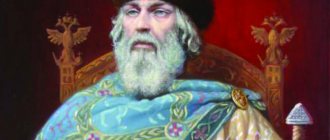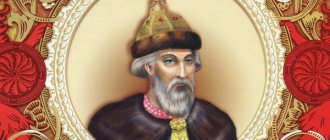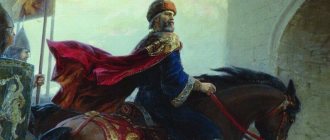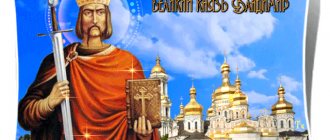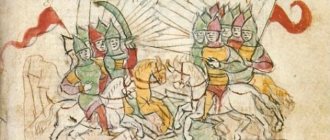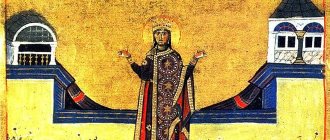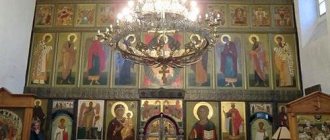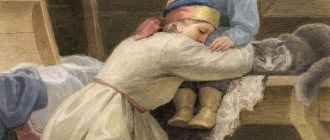During the heyday of Byzantium, the strengthening of its rival - the Holy Roman Empire, the atrocities of nomadic tribes, and intra-clan feuds, the prince in Rus' was Vladimir Monomakh. The land under his control had all the signs of statehood: the Orthodox religion, written law, centralized taxes, a single territory. Taking into account her problems, the ruler wrote “Instructions for Children,” which became a monument of literature of the 12th century.
General information
Note 1
“The Teachings of Vladimir Monomakh” is an excellent monument of ancient Russian literature of the 12th century, which has not lost its significance even 900 years after its creation.
The author himself occupied a special place in the history of ancient Russian literature and culture, as he promoted the ideas of peace and harmony for all Russian lands, and was an outstanding statesman and thinker. Vladimir Monomakh (1053-1125), according to the historian Karamzin, wrote his famous work in 1117. Many historians have called this work the first secular sermon in the history of ancient Russian literature.
The “Teaching” consists of three parts:
- Teaching,
- Monomakh's story about his life,
- Letter from Monomakh to Oleg Svyatoslavich.
Are you an expert in this subject area? We invite you to become the author of the Directory Working Conditions
The three parts of the “Instruction” are connected by a didactic narrative. While the first part contains direct advice on how to behave, the following parts complement and support this advice with personal biographical facts.
Monomakh’s work contains three main pieces of advice that he gives not only to his contemporaries, but also to his descendants:
- "Do good"
- "Don't be lazy"
- “Know everything.”
Monomakh created the image of an ideal ruler (head of state) and an ideal citizen (Orthodox resident of Rus').
The ruler must be a firm believer, repentant of his sins or mistakes, protect the weak and do good deeds. He must be responsible, hardworking and honest. Another important quality of an ideal ruler is courage, which manifests itself in dangerous hunting and battle. The ideal of the Old Russian citizen is the most ordinary person who prays to God in church, and does not forget about prayers in other circumstances. He is a true Christian who admits his sins, helps orphans and widows, feeds and clothes the poor, honors the ministers of the Orthodox Church, and equally respects both commoners and nobles.
Finished works on a similar topic
Coursework Teaching by Vladimir Monomakh 480 ₽ Abstract Teaching by Vladimir Monomakh 280 ₽ Examination Teaching by Vladimir Monomakh 230 ₽
Receive completed work or specialist advice on your educational project Find out the cost
The entire work of Monomakh is imbued with the sincere feelings of the author, which suggests that his personal religious experience underlies the “Teachings
In the "Teachings" Monomakh quotes Psalms 36 and 55. In his work, Monomakh mentions many Russian cities: Vladimir, Berestye, Kursk, Pereyaslavl, Novgorod, Rostov, Polotsk, Starodub, Smolensk, Turov, Suteysk, Goltav, Chernigov, Romny, Lubny, Vyr Voin, Kordno (Kordno).
Family tree of Monomakh
A descendant of the Rurikovichs, who opened the path “from the Varangians to the Greeks,” Vladimir Vsevolodovich was born in 1053. The glorious path was completed by the prince of Kyiv in 1125.
Monomakh's genealogy presents him as:
- grandson of Yaroslav the Wise;
- son of the first holder of the title “Prince of All Rus'” Vsevolod Yaroslavovich;
- a descendant of the Byzantine emperors Monomakhs from the Macedonian dynasty by maternal line.
Childhood and adolescence
Monomakh is translated as “combatant”.
The given name confirmed his readiness for any tests:
- since childhood, Rurikovich conquered the wilds of the Bryn forest;
- the youth defeated the hero from Kafa;
- At the age of thirteen he received the princely title and took part in military campaigns.
Vladimir's mother was Greek, his stepmother was Polovtsian Princess Anna. A multi-ethnic family shaped his peace-loving character traits. At 21, he himself became the head of the family. His English wife, Gita of Wessex, gave birth to five sons. She followed her husband on hikes. According to one version, Monomakh’s first wife rested in Palestine. His subsequent marriages took place after forty years.
Great Reign
The character and will of the future head of state were tempered in battles, and the Christian worldview was nourished. As he himself testifies in his instructional word, only the Lord preserved him in battles with animals, people and in extreme situations.
In various circumstances, the enemies and allies of the Grand Duke were:
- Cumans;
- torques;
- Rurik brothers.
Vladimir Monomakh was in no hurry to take power in Kyiv. But when he was almost sixty, a popular uprising broke out. It flared up immediately after the death of Svyatopolk and forced the prince of Pereyaslavl to accept the grand-ducal scepter in Kyiv. The death of his predecessor is surrounded by controversial historical implications. It was not the first sign of fratricidal conflicts among the Rurikovichs. But this is not surprising - power in all centuries has been obtained with blood. Monomakh's commandments to his children are an attempt to stop the vicious laws of wars between heirs to the throne.
The most significant events during Monomakh's reign were:
- Treaty of 1072 - “The Truth of the Yaroslavovichs”;
- congress in Lyubich in 1097;
- expulsion of the Cumans in 1111 to the outback under the specific name Tmutarakan.
Descendant of the Rurikovichs and Monomakhs - ruler and author of an ancient manuscript
At the end of the 18th century, it turned out that the library archive of Count Orlov’s adjutant, Musin-Pushkin, contained the Laurentian Chronicle with the “Teaching” of Monomakh. This manuscript managed to avoid the fate of most of the archive, which disappeared without a trace. The written statements of the rulers have historical significance. Among important state acts, a special place is occupied by instructions to the descendants of Vladimir Monomakh. Paying attention to the approximate year the commandment was written - 1099, it should be noted that by the time he ascended the Kiev throne in 1113, the author had all the makings of a supreme ruler.
The chapter of the Russian land united two principles:
- secular;
- spiritual.
Who is the author of the teaching and instruction does not arise for historians. This is Vladimir Monomakh himself. But in those days the Orthodox Church was subordinate to the Byzantine bishopric. It sent metropolitans to Kyiv. It is obvious that the tasks of secular power were formed under the influence of the religious literature of the holy fathers appointed by Byzantium. Therefore, Monomakh’s work is based on the “fear of God”, quotes from the Psalter of David. A contemporary of Monomakh and his spiritual guide was Metropolitan George, a Greek by nationality. This name appears in The Tale of Bygone Years. Also, an equally important role as his teacher in the period described is played by George’s successor, John II. They served as an example for the princes, as they themselves actively expanded ancient Russian writing.
Teaching
Addressing directly to his children and all those who will one day read his message, Prince Vladimir Monomakh exhorts them, first of all, to have the fear of God in their hearts and to do good, remembering that man’s days on earth are fleeting and it is terrible to die without repenting of his sins . The desire to write down his cherished thoughts - the fruit of mature thoughts and rich life experience - arises in the prince during his journey along the Volga, where he meets and talks with the ambassadors of his brothers. The brothers invite the prince to join them against the Rostislavichs and take away their lands. If the prince does not want to join their campaign, then in case of war he should not count on their help.
Tired of the civil war, not knowing what to do, the prince opens the Psalter at random and, consoled by wise words, decides to write a book of teachings for his children and grandchildren, to which will be attached a true and comprehensive story of his life.
The prince calls on his children not to be lazy and to always remember that God’s mercy can be found not only through strict solitude, monasticism and fasting, but also through good deeds. The prince encourages his children not to forget about prayers, no matter what they do. But at the same time, he admonishes them not to neglect the study and acquisition of knowledge: he sets them as an example his father, who “sat at home, knew five languages, and therefore the honor of other countries.” The prince tries to instill in his children moral standards based on the Christian faith, and also gives them purely practical advice:
- always respect elders;
- in war, do not rely on chance, but establish strict order and demand its respect;
- during wars, never part with weapons;
- do not allow your servants to harm the peasants;
- love your wife, but do not give her power over you.
Great Russian Prince
Against the background of anger, violence and treachery, Monomakh was a bright man. The princes feared and at the same time greatly respected him; for them he was a merciful and fair sovereign. The reign of Vladimir Monomakh at one time was the happiest for the entire people. A summary of the “Teachings” of Vladimir Monomakh says that with his reign the cherished dream of his grandfather Yaroslav the Wise came true, who wanted a man on the royal throne who was a strict and at the same time loving father for the appanage princes.
This was Vladimir Monomakh, who judged everyone himself at the princely court and never allowed the strong to offend the weak. He supplemented the “Russian Truth” with a decree that stated that lenders should not take large excesses (interest) from debtors.
Monomakh's story about his life
Having begun the story about his life, the prince noted that he began an independent life at the age of thirteen, when his father sent him to Rostov through Vyatichi. Monomakh repeatedly traveled from Chernigov to Kyiv with his father, often made peace with the Polovtsian princes - both with and without his father, and during the wars he killed about two hundred Polovtsian soldiers in battles. In addition, the prince was an avid hunter. Monomakh tells how in Chernigov he “caught wild horses with his own hands,” hunted wild boar, bear, and elk. At the same time, Monomakh did not shift all the responsibilities for running the hunting farm only to the servants; he did a lot himself.
Concluding the story, the prince expresses the hope that his children will not judge him, because the last thing he thought was to show off his courage and valor to them, since he only wanted to glorify God and glorify his mercy. The prince convinced the children not to be afraid of death, because a person will die only if God allows it.
Three important good deeds
A person with three good deeds - tears, repentance and alms - can get rid of his sins and not lose the most important thing - the Kingdom of God. This commandment is not at all complicated, but very important. Neither fasting, nor hermitage, nor monasticism are as important for some pious people as these three things.
The summary of the “Teaching” of Vladimir Monomakh continues with the fact that the author seems to warn that if anyone takes at least half of what is said to heart, God will have mercy on him, like that tax collector and robber. You need to repent tearfully of your sins and constantly; Wherever a person is, no matter what he is doing, read the Jesus Prayer: “Lord, have mercy.” She's the best.
An Orthodox Christian should not forget about the poor, but, if possible, feed them. Always judge the widow and orphan truthfully and do not offend the powerful. You cannot kill a person, even if he deserves it and is guilty of the most terrible things. There is no need to talk about swearing to God and being baptized at the same time. Before you take an oath and at the same time kiss the cross, you need to think carefully so as not to destroy the oath and at the same time your soul.
Letter from Monomakh to Oleg Svyatoslavich
The third part of the “Teachings” is a letter to Oleg Svyatoslavich, which Monomakh wrote shortly after the tragic events of September 6, 1096 in Murom, where Monomakh’s son died in a battle with Oleg. After listening to the advice of his eldest son, who was baptized by his cousin Oleg Svyatoslavich, the prince wrote him a letter in the hope of reconciliation. The prince advises Oleg to send his daughter-in-law, the widow of the murdered man, to him, because this is what their fathers and grandfathers did when they wanted to make peace. Since the dead can no longer be brought back, and judgment comes from God, and not from the one who killed, then one must turn to God, who can enlighten and guide the steps of sinful man. Concluding the message, Monomakh told his brother that he strives for the good of all the brothers of the Russian land, and begs him not to try to get by violence what can be obtained as a sign of sincere care and blood ties.
Get paid for your student work
Coursework, abstracts or other works
Why is Monomakh famous in history?
On May 4, 1113, Vladimir Monomakh became the Grand Duke of Kyiv. During his reign, he managed to lead several successful campaigns against the Polovtsians, who were ravaging Russian lands, and to stop their raids for several decades, as well as to extinguish the fire of princely civil strife for 12 years.
Interesting materials:
How to feed geraniums to make them bloom? How to feed maggots for fishing? How to feed chrysanthemums after winter? How to feed strawberries in the fall after processing? How to feed gooseberries in August? How to feed daylilies before flowering? How to feed Remontant strawberries after the first fruiting? What to prop up strawberries with? How to paint heels on shoes? How to paint a metal structure?
Age-old wisdom
Bishops, priests and abbots of monasteries must always be revered, loved and, to the best of our ability and ability, cared for so that they can always pray for all of us. Pride is a terrible vice for a person, therefore it is necessary to fight and get rid of it in the heart and mind, because all people are mortal, and everything that is given to us by the Lord is only for a while. Further, a brief summary of the “Teachings” of Vladimir Monomakh tells that an old man must be revered as a father, and a young man as a brother.
You shouldn’t be lazy in your home; you need to look after the entire household yourself so that no one can laugh at your home and dinner. In war, you should not rely on your commanders, be lazy and relax. You need to place the guard yourself. You have to get up early and go to bed near the soldiers. Whether there is danger or not, you must always have a weapon with you. A careless person may die suddenly. When traveling around your lands, you must ensure that the servants do not harm or commit outrages either on their lands or on others, so that no one curses you later.
Moscow – Third Rome
We could have ended the discussion of the topic “Vladimir Monomakh. “Teaching”: a summary,” however, I would like to mention one more important point. There is a legend that says that all of the above items were sent as a gift to his grandson, Vladimir Vsevolodovich Monomakh, by the Byzantine Emperor Constantine IX Monomakh (his maternal grandfather). And how symbolic it became! The brilliant but already rotten Byzantium fell, the Second Rome fell after the First, and now the Third Rome appeared - Moscow - the Great Holy Rus'. The Monomakh cap became a symbol of the continuity of power and Orthodoxy from the Byzantine emperors. Subsequently, the Moscow kings placed it on their heads during their royal crowning.
“Teaching” by Vladimir Monomakh in a brief summary cannot convey all the strength, power and correctness of his wise instructions. Therefore, reading the original text will be very useful.
